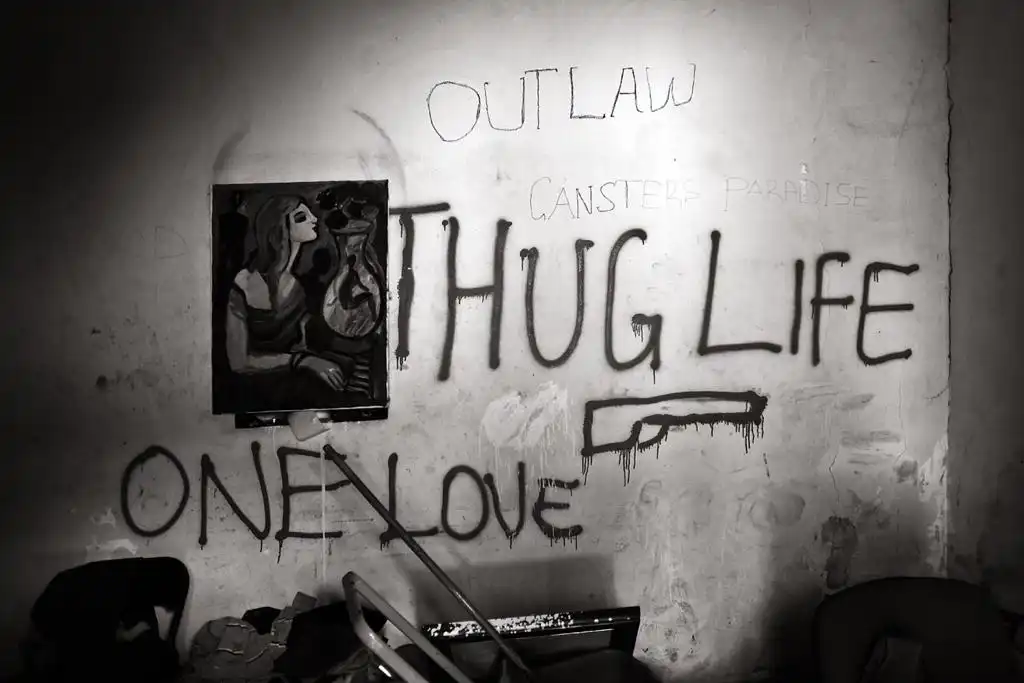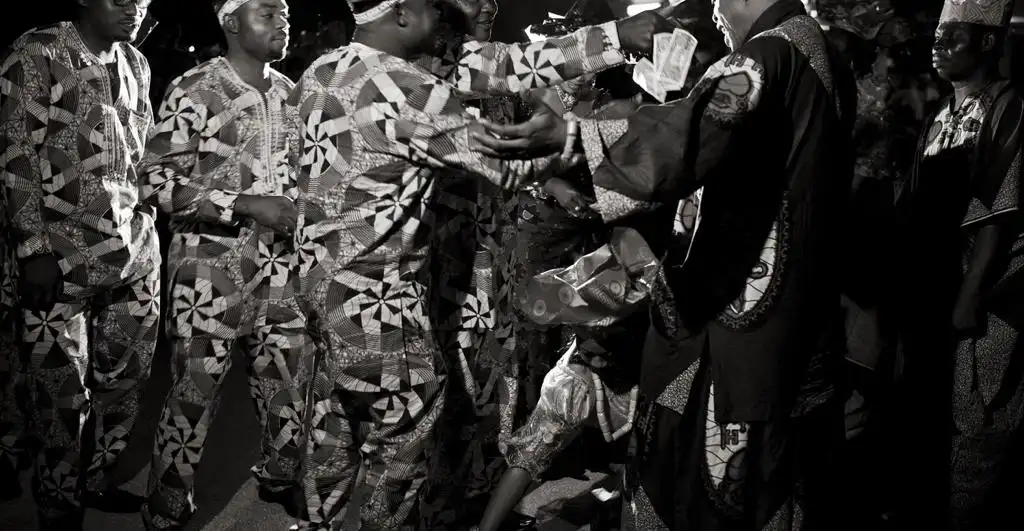Home>Nigerian Confraternities out to Conquer the World? Interview with Corentin Cohen
17.02.2022
Nigerian Confraternities out to Conquer the World? Interview with Corentin Cohen
While the Nigerian brotherhoods have become increasingly prominent in the media given the criminal threat they are said to represent, they have not been the subject of any field research in Nigeria or Europe. In his Etude du CERI, Corentin Cohen develops a socio-historical approach and puts into perspective the global expansion of these confraternities since the 2000s. Behind a discourse of empowerment and solidarity, these groups constitute a transnational network which perpetuates a conservative order, a social hierarchy and the inequalities which they help to naturalize. Who are these groups and what aim to they follow? The author answers our questions.
Europeans tend to have a very negative image of Nigerian migrants, with men often pictured as procurers and women as victims of sexual exploitation. You disagree with this image. How does the media convey this image and how does it contribute to the criminalisation of Nigerian immigration?
Nigeria is often considered a violent country, plagued by permanent instability. Since the Biafran War (1967-1970), most international medias have focused on conflicts such as those in the Niger Delta, the Lake Chad Basin with Boko Haram, or the more recent Middle Belt conflict. This perception of the country is largely explained by the narratives offered by the media, the vast majority of which reproduce the often-racist discourse on African and Nigerian migrants. Due to a lack of empirical fieldwork, most of the press articles focus on the criminal stories or miscellaneous news items, which do not allow for any reflection on Nigerian migration. The media echo the police investigations and participate in a criminogenic approach to certain groups, often defined in ethnic terms. Their discourse reactivates the figures and the imaginary of black pimps, well known since the 1930s.
Yet these sources are questionable. Police and magistrates have biased and fragmented perspectives. In France, confraternities are viewed through the lens of human trafficking and prostitution; in Italy, they are viewed through the lens of organised crime; in the Netherlands, through the lens of drug trafficking; and in the United States, through the lens of online scams and fraud.
The term confraternity seems to cover very different kinds of organisation depending on the context, but what exactly is a confraternity? Who are its members and how are they recruited? What is the hierarchy of this organisation? How is the confraternity financed?...
This Etude du CERI attempts to answer these questions through approaches that are precise and well-researched, which has led to challenges related to methodology and data. Confraternities originated as student societies, emerging in the 1960s in universities in southern Nigeria. At that time, only students with certain intellectual qualities could become members. Like other secret societies, confraternities spread, even though from the 1970s onward they were banned and fought against.
They bring together people from different social categories. Members are autonomous and each confraternity has its own mythology, initiation rites, codes, and vocabulary. For example, in the Supreme Eye confraternity a local registered group is called a “nest”; the Black Axe calls it a “zone”; and the Maphites call it a “chapter”. Each of these groups has its own specific organisation and hierarchy.
The members finance the confraternity by paying fees. It is worth noting that most of them are not involved in illegal activities, even though the organisation is positioned at the crossroads of politics, illicit markets, and life on the streets.
There are major differences between certain confraternities from the Niger Delta. The Icelanders, for example, are close to the region’s militias and involved in protecting the oil infrastructure but also in attacks on pipelines. Other groups, such as the Buccaneers, stick to their original academic background. The Black Axe, originating from the Edo region, is perhaps the best-known confraternity in Europe. It is established in over twenty countries.

Photo by Giovanni Izzo
My observations and interviews show that there is a significant gap between what the confraternities say they are—crime syndicates or pan-Africanist self-help organisations—and what they actually are. Their codes, organisational structures and modes of operation are far removed from the rules they advocate and their own reference texts. Further ethnographic research, as has been done in Central and South America, is needed to better understand how the members of these confraternities are embedded in local markets, their practices, their links to politics, and their individual trajectories.
Is there a link between the expansion of confraternities and the evolution of migration flows? Furthermore, how and why are confraternities interested in Nigerian diasporas?
The two phenomena—expansion of confraternities and changing migration patterns—are not linked. Confraternities have been present in Europe since at least the early 2000s and even before then for some of their members. The social visibility of the migration phenomenon following the so-called migration crises of 2015 has led to the rediscovery of confraternities. In Europe there was interest in sex trafficking and Nigerian prostitution around that time, particularly because of NGOs calling attention to this social problem that had not worried public authorities before. Since then, one thing has led to another, and political discourses—which, like those of the Italian extreme right on the Nigerian mafia, are often xenophobic towards Nigerians—have brought the question of confraternities back to the fore. Meanwhile in Nigeria, the social sciences have abandoned this area of research.
Migration is a windfall for the members of confraternities in Europe. The influx of migrants who have no right to work in the host country and no income, and who are unlikely to approach the state for assistance, is an opportunity for members of the confraternities to exploit this labour force. Women are prostituted, newcomers are used as easy labour, forced to do favours, and sometimes forced to repay the debts related to their journey to Europe several times over. Nevertheless, and contrary to what is often said, the Nigerian confraternities have forbidden their members living in Europe to recruit, as they wish to control the profiles of new members themselves.
In Europe, some members of the confraternities claim to offer opportunities, protection, and social advancement, and they claim to advocate equality and brotherhood among the members of the confraternity. However, the prospects of migrants within the groups are limited by the big men who seek to assert their political power, as well as by families and dynasties who use the confraternities as a tool for their personal advancement.
Furthermore, it is striking that in Nigeria prominent members of the confraternities are involved in the (human and financial) management of diasporas and migrants returning from Libya.
You explain that the confraternities have created structures that give them legitimacy and that they use to carry out various solidarity initiatives or to get involved in social or political mobilisations. Can you tell us more about this and give us some examples?
These organisations do not seek legitimacy, they are part of society. Since the 1990s, members of the confraternities in Nigeria have often been mobilised by politicians to bring about order or disorder. They take part in the existing system of political patronage. In recent years, the confraternities have also benefited from various social movements in civil society. They have taken a position on the discourses of young people and the demands of citizens; they have called for mobilisation against slavery in Libya, against xenophobic violence, against Nigerians in South Africa, etc. At the beginning of the COVID pandemic, some members in Europe and Asia organised food collections and supported diaspora charities. You can see this philanthropy as a facade, but I think it's one of the activities that is part of their embeddedness in markets and territories, in networks of political exchange.

Photo by Giovanni Izzo
In your Etude, you write, “confraternities are a political instrument that reinforces a conservative social order”, “they help to reassert the power of traditional authorities”. Can you elaborate on this idea?
Despite progressive discourses and mobilisation around equality, empowerment, promises of upward social mobility, and the promotion of material success by members, the values advocated by the confraternities mainly reflect those of the Nigerian elites. They are ultimately very conservative, focused on the preservation of order, the family, and the social status quo, which justifies strong inequalities.
In Europe, the confraternities give pride of place to moral discourses that justify the differences in status between their members. Their words echo those of the pastors they sometimes invite. They praise and proclaim traditional authority. Many of their members see themselves as vectors of the latter. Certain dynasties or families rule within these organisations. I have observed that the relationships between members, which are supposed to be highly regulated and codified, are in practice largely dependent on executives who accumulate resources by using their positions of power within the confraternity. So, in Nigeria, the confraternities participate in a form of supervision over young people; in Europe they supervise the diaspora through social reproduction and synergies with the traditional power of important families and elites, particularly those from the Edo region.
Interview by Corinne Deloy. English version by Miriam Périer and Katharine Throssell.
All photos by Giovanni Izzo
Read this Etude du CERI :
- in English: Nigerian Confraternities to Conquer the World?, Etude du CERI, n° 258bis, December 2021.
- in French: Les confraternités nigérianes à la conquête du monde ?, Etude du CERI, n°258, December 2021.
Follow us
Contact us
Media Contact
Coralie Meyer
Phone : +33 (0)1 58 71 70 85
coralie.meyer@sciencespo.fr
Corinne Deloy
Phone : +33 (0)1 58 71 70 68
corinne.deloy@sciencespo.fr
